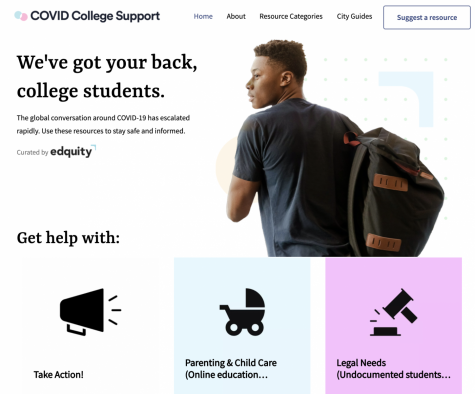6 tips and resources for parenting students during the COVID-19 pandemic
With classes still fully remote, many college students also home schooling children

City College students with kids face new challenges in the fall term. File photo
September 30, 2020
Teaching online school for children is making student-parents’ lives much harder.
This new parental chore brought to us by the coronavirus pandemic is a national issue. Almost 4 million college-level students are parents or guardians of children under the age of 18.
At San Diego City College, the exact number of student-parents is not shared on San Diego Community College District demographic reports.
But 27% of City College students reported having one or more dependent who relied on them last spring, the most recent data that is available.
These students, who were already facing financial, food and housing insecurities, are now dealing with new challenges.
Despite a lack of, or limited, childcare options, students are expected to log into their own classes on time, meet deadlines and submit assignments all while feeding and educating their children.
This list of resources provides information on student-parents’ basic needs. And remember, you should always seek support from City College, too.

1. Meet the basic needs of you and your family
To start exploring your options as a college student impacted by the pandemic, check out COVID College Support for the up-to-date list of resources and tips. Benefit Finder is a great tool to help you get started and explore your options and eligibility.
Those who work in the service industry and are affected by the pandemic can apply for an emergency fund. If you have no income, you can be eligible to apply for Temporary Assistance for Needy Families. If you have lost your job, check if you meet the requirements for filing a claim for unemployment insurance.
Together We Rise provides emergency financial assistance for homeless or housing insecure college students. You can also apply for emergency aid at your college or university.
Check with your City College’s Financial Aid, Students Services or EOPS offices to learn if you are eligible for food assistance through the Supplemental Nutrition Assistance Program (SNAP). For assistance with the location of meal sites for children when schools are closed, use meal site finder. If you have a baby, connect with your local diaper bank and maternity care nonprofit if you need access to low-cost or free baby gear.
2. Get tips and support online
Free parenting support guides are available online and contain valuable information. Check out this website that provides support for families struggling with mental health and learning disorders. The Centers for Disease Control and Prevention also has parental lists of resources for children of all ages.
For free educational resources for younger children, check out Amazing Educational Resources. For older children, check out this learning site with lessons on migration, creativity, climate change and nature. UC Davis MIND Institute provides teaching and coping resources for parents of children with autism during the coronavirus pandemic.
3. Protect your health
You might be eligible for certain health insurance plans, even free or low-cost coverage through Medicaid. You can explore your options, designed specifically for young adults, college students and children.
Most children can get coverage through the Children’s Health Insurance Program (CHIP), even if you do not qualify. Low-cost online or free in-person healthcare options are also available.
If you do not have health insurance or not eligible for it, find a free clinic or community health center. City College also has a student health center available.
4. Consider childcare options
In pre-pandemic times, students relied on schools and childcare centers, just like other parents. Some had help from family members, but that option has become more difficult because no one wants to risk putting the whole family at risk.
Childcare Aware of America provides state-by-state information on childcare resources. Check to see if you are eligible for childcare subsidies.
To find direct links to family and childcare resources state-by-state, use COVID-19 Resources and Information.
5. Focus on keeping things simple and organized
If you can, create a designated space for you and your children. It might be your own desks or even a dining table. Consider sharing a table or another consistent study space with your child but make sure to have headphones handy for everyone.
Keeping track of simple things such as making sure that all devices are charged and Wi-Fi is working, will make every day much easier.
If you do not have access to a computer, consider submitting an application to a local nonprofit organization Computers 2 Kids, San Diego (C2K), which provides San Diego families with laptops.
6. Take care of yourself and let children have fun during these stressful times
It is a stressful time for student-parents, and it’s easy to forget about basic self-care when you are struggling to meet your family’s basic needs. Experts recommend focusing on realistic self-care, not the one we would have in pre-pandemic times.
Something like a quick online yoga on YouTube or a five-minute chat with a friend can help with reducing stress. The CDC website also offers recommendations on coping with stress.
Adequate sleep, exercise and outdoor time, as well as good nutrition is equally important for all – adults and children. Most importantly, try to stay compassionate toward yourself and your children. We have never lived in a pandemic before and we are all in this together.
Link: 87 family activities to help you avoid coronavirus cabin fever
City Times wants to hear your voice. We are looking for our community — fellow students, faculty, staff and alumni — to share their perspectives on balancing your classwork with parenting. You can send your thoughts in writing by email or share them on social media, including @sdcitytimes and #cityspeaks. You can also leave us a voice recording.










